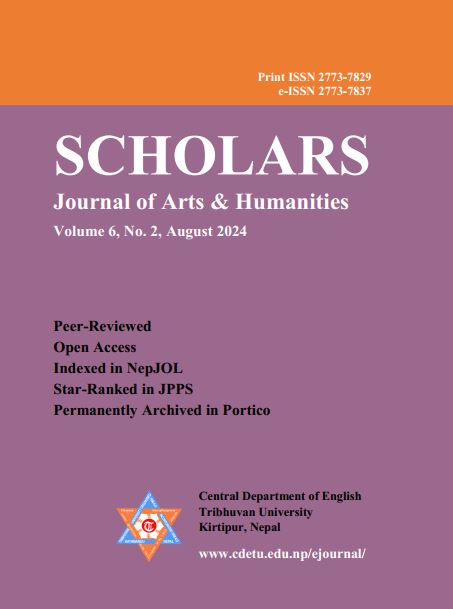Transcending Borders in Orhan Pamuk’s My Name Is Red
DOI:
https://doi.org/10.3126/sjah.v6i2.68746Keywords:
Art, border theory, cross-culture, liminal spaceAbstract
Orhan Pamuk's novel My Name Is Red (1998) blurs the territory-bound art, cultural fences, and national boundaries to promote fraternity and connectivity through the two-fold strategy of obliterating conflict and encouraging philanthropic sensibility. This paper has examined the crossing of the divide in the massive migration, international trade, and refugee problems of the border postulated by Alejandro Lugo, Atzili Boas, Victory Konrad, and Anne-Laure Amilhat Szary’s border theory that emerged post-1990. Based on the insights of this theory, this paper argues that the ultimate resolution for the ongoing struggle among the people from diverse political, geographical, ethnic, and anthropological backgrounds in the third space is through the elimination of the territorial differences and the advancement of cross-cultural assimilation and humanitarian approach. This study uses qualitative research design to validate the argument that the territorial boundaries between the nations trouble social synchronization. The study’s finding reveals that the arts such as paintings transcend political division and promote the cultural adjustment in the liminal space. Istanbul is the setting that represents the transitional landmark between Southeast Asia and Europe as a cross-cultural and cross-border notion. The painting of the natural objects and the human procession merges the Eastern and the Western essences. The novel surpasses the conformist boundaries and endorses a multicultural artistic society without any religious, cultural, and geographical discrimination. Therefore, art functions as a tool to promote the aura of art, and such a sensation becomes the tool for the extension of psychological, physical, and social well-being.
Downloads
Downloads
Published
How to Cite
Issue
Section
License

This work is licensed under a Creative Commons Attribution 4.0 International License.
© Central Department of English, Tribhuvan University and Authors




